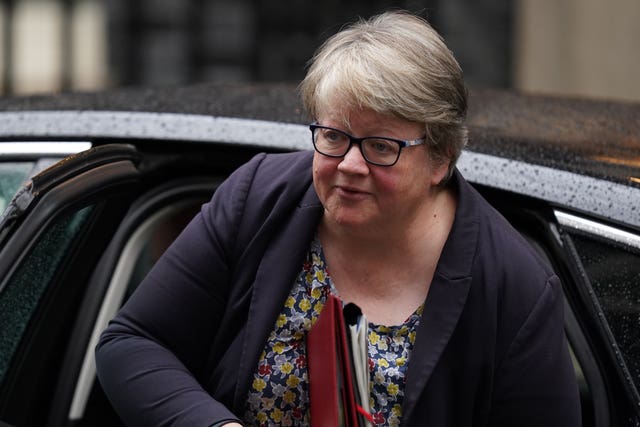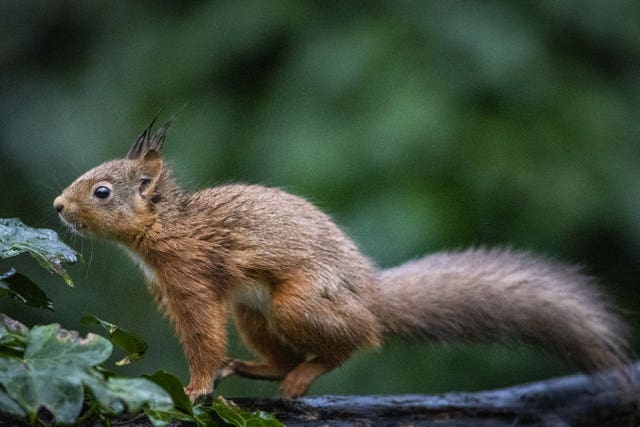Environmentalists have condemned the Government’s environment plan aimed at helping create a greener, cleaner country as a “road map to the cliff edge”.
The comment from Greenpeace comes as the Government sets out its environmental improvement plan for England. Friends of the Earth have described it as “just rehashed commitments”.
The scheme is built on a vision set out five years ago in the 25 Year Environment Plan, including new powers and duties under the Environment Act, Agriculture Act and Fisheries Act, to provide ways to restore nature and improve the environmental quality of the air, waters and land.
This was the central target agreed in the global deal for nature at the UN Nature Summit COP15 in December.

Environment Secretary Therese Coffey is set to unveil the plan, which also stresses that progress can be measured against interim targets, on Tuesday.
Prime Minister Rishi Sunak said: “Protecting our natural environment is fundamental to the health, economy and prosperity of our country.
“This plan provides the blueprint for how we will deliver our commitment to leave our environment in a better state than we found it, making sure we drive forward progress with renewed ambition and achieve our target of not just halting, but reversing the decline of nature.”
At least 500,000 hectares of new wildlife habitats, starting with 70 new wildlife projects including 25 new or expanded National Nature Reserves and 19 further Nature Recovery Projects are to be created and restored under the plan.
The Government is also to deliver a clean and plentiful supply of water for people and nature into the future, by tackling leaks, publishing a roadmap to boost household water efficiency, and enabling greater sources of supply.
Councils are to be challenged to improve air quality more quickly and tackle key hotspots and there is also a pledge to transform the management of 70% of the countryside by incentivising farmers to adopt nature-friendly practices.
Boosting green growth and creating new jobs, ranging from foresters and farmers to roles in green finance and research and development, is another pledge.
Ms Coffey said: “Nature is vital for our survival, crucial to our food security, clean air, and clean water as well as health and well-being benefits.
“We have already started the journey and we have seen improvements.
“We are transforming financial support for farmers and landowners to prioritise improving the environment, we are stepping up on tree planting, we have cleaner air, we have put a spotlight on water quality and rivers and are forcing industry to clean up its act. ”

The plan includes a multi-million pound Species Survival Fund to protect rare species, from hedgehogs to red squirrels, is promised along with a pledge that Government support schemes will help 65 to 80% of landowners and farmers to adopt nature friendly farming practices on at least 10 to 15% of their land by 2030.
They are also to be helped to create or restore 30,000 miles of hedgerows a year by 2037 and 45,000 miles of hedgerows a year by 2050.
Other commitments include actions to tackle water efficiency in new developments and retrofitted properties, including reviewing building regulations and other legislation to address leaky toilets and dual flush buttons and to enable new water efficient technologies.
The restoration of 400 miles of river through the first round of Landscape Recovery projects and establishing 3,000 hectares of new woodlands along England’s rivers is also promised.
The current regulatory framework is to be rationalised to try and create a more efficient system.
There is also to be an effort to cut ammonia emissions through incentivised farming schemes and also to improve the way air quality information is communicated with the public.
Dr Doug Parr, of Greenpeace UK, said: “If this is a road map, it’s a road map to the cliff edge.
“Here’s yet more paperwork containing a threadbare patchwork of policies that fail to tackle many of the real threats to our natural world. This won’t do.
“Ministers want to crack down on dual flush toilets while letting water firms pump tonnes of raw sewage into our rivers and seas.
“Until we see immediate action (from) this Parliament to ban industrial fishing in all our marine protected areas, reduce industrial meat and dairy farming and ramp up protections across a bigger network of national parks and areas of outstanding natural beauty, we’re in real danger of UK nature going into freefall.”
Paul de Zylva, of Friends of the Earth, said that “on closer inspection it seems that many (of the measures) are just rehashed commitments the government is already late on delivering – and it’s unclear how others, such as ensuring everyone can live within a 15 minute walk of green space, will actually be met”.
He said: “There’s also a big emphasis on improving air quality which is completely at odds with the government’s £27bn road building agenda, raising serious questions over whether councils are being set up to fail.”




Comments: Our rules
We want our comments to be a lively and valuable part of our community - a place where readers can debate and engage with the most important local issues. The ability to comment on our stories is a privilege, not a right, however, and that privilege may be withdrawn if it is abused or misused.
Please report any comments that break our rules.
Read the rules hereLast Updated:
Report this comment Cancel